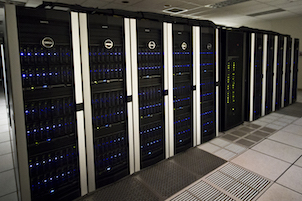Today DDN announced that the Texas Advanced Computing Center has selected the company’s new SFA14K to deliver the performance, capacity and density needed for TACC’s latest Lonestar supercomputer. With 50 percent more cores and four times the performance of its predecessor, Lonestar 5 required the most advanced storage solution to support an exponential surge in big data resulting from hundreds of diverse research projects in astronomy, computational science, physics, bioinformatics, biomedicine, climate change, life sciences and more.
With the game-changing SFA14K, TACC can power major scientific advances like helping biologists save reef-building corals, finding links between DNA mutations and cancer, as well as identifying new treatments for brain tumors and Alzheimer’s disease. Additionally, TACC can take advantage of heightened performance and capacity to handle a huge mix of application workloads from thousands of researchers across The University of Texas system and its research institutions along with partners at Texas A&M and Texas Tech.
“The most important factor in our storage decision was being able to scale out to very high performance and capacity levels,” said Tommy Minyard, director of advanced computing systems at TACC. “With DDN’s latest and most powerful storage system, we will be able to support extremely data-intensive research projects across nearly every field of science—from a user running a single core to one running with 30,000 cores.”
The new SFA14K builds on DDN’s storage leadership to deliver up to 10 times the performance of previous generations and up to 40 times the performance of competing platforms. For TACC, the ability to exceed throughput of 100GB/second and more than seven petabytes of storage in a single rack delivers the ideal balance of performance and capacity within a smaller data center footprint.
The DDN system, running Intel Enterprise Edition for Lustre software, is configured with 5PBs and can scale out to more than 100 PBs as needed. With its latest storage advancements, DDN surpassed TACC’s initial performance and capacity expectations, which will enable the organization to keep pace with storage growth that continues to double annually.
Users are generating and analyzing the data on storage more than ever before,” said Minyard. “In particular, an influx of non-traditional HPC research involving life sciences, biomedicine and unstructured data analytics is causing explosive growth. By building on our longstanding partnership with DDN, TACC will be able to give researchers the power to achieve astounding discoveries with far-reaching positive impact.”




